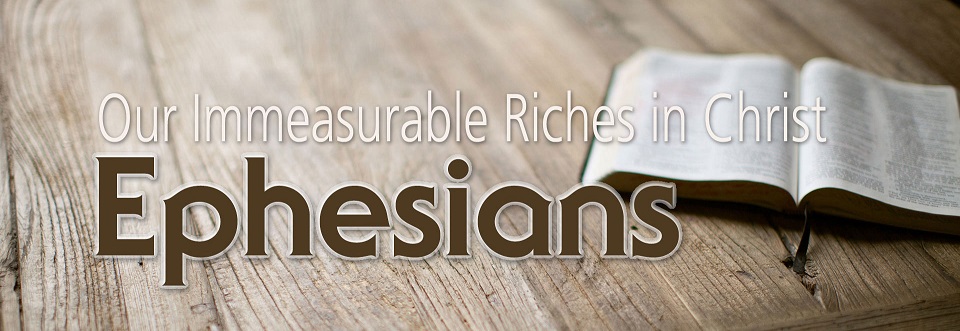Many people love Ephesians for the way it explains who we are in Christ. That phrase (or in him) turns up 20 times in the first three chapters.
But if the phrase has you thinking about your personal identity, you’ve barely scratched the surface. Ephesians makes a gigantic claim: God is restoring the broken fragments of humanity, bringing us all together into communal life under King Jesus.
Imagine a world released from its dead existence under evil, raised to life in God’s anointed, participating in his resurrected life as he restores us all into community under his kingship.
Don’t miss the scope by reading it as a story about me. For example, Ephesians 2 opens:
2 1 As for you, you were dead in your transgressions and sins …
I hear you. Your guilt kicks in and you respond, “Yep, that’s me. I was dead in my …”
But that’s not the response the writer wanted:
- You is plural. He was thinking of a defunct community, crushed under evil.
- In verse 3, you suddenly switches to we. No, the writer is not attempting empathy, naming himself as a guilty individual. The sense of the whole chapter rests on picking up the difference between the two groups — you and we.
Intrigued?
Before Jesus, the world was divided into two groups from God’s perspective. The nations that were far from divine kingship because they had gone their own way (Genesis 10). And then there was God’s nation, Abraham’s descendants, rescued from Pharaoh’s oppression and established under God’s kingship by the Sinai covenant. While God had always promised to reign over everyone (the covenant of Genesis 9), God had let the nations go their way, concentrating on Israel as the nation that represented him.
This all changed when Jesus arrived. The rebellion against God’s kingship reached its full measure when the leaders of God’s nation handed him over to be slaughtered by their oppressors. This collusion to assassinate God’s anointed revealed the extent of the rebellion against God: Israel and the nations were all dead under evil, instead of living under God.
These are the two groups in Ephesians 2. Ephesus was in Western Turkey. A Jewish writer found it perfectly natural to address gentiles as you, and refer to his own people as we.
You (gentiles), he says, were far from God, stuck in death by the rebellion against God’s kingship. But we Jews were too. Both groups colluded against God to crucify his anointed (compare Acts 4:27), bringing Jesus down into the death we shared.
But look what God did! When God raised him up out of death, Jesus had brought both warring groups together in his own being. His resurrection is therefore the end of hostilities against God and the end of the fragmentation of humanity (verses 11–22).
So here’s Ephesians 2:1-10, expanded to help us catch the message:
Ephesians 2 (an interpretative translation, compare NIV)
1 You who were not part of the covenant in Old Testament times were already dead, stuck in the long-standing rebellion and disobedience to the heavenly king. 2 You had a zombie-like existence during the era dominated by this world — dead things under the control of a ruler with authority from something less than Heaven, the spirit that still drives those born into the rebellion.
3 We Jews lived the same way back then. We were stuck in our broken nature’s cravings for power, captive to the scheming desires in our body and mind. We made God just as angry as the nations did, because we were descendants of human brokenness too. 4 But we have a heavenly sovereign who overflows with mercy for his broken people. Just look at the extent of his love, his love reaching out to us in his Son. 5 And since we (the whole Israel nation) had died in the rebellion against God, he plugged us into his Anointed and brought us back to life in him. We were rescued out of death by our sovereign’s generosity — 6 co-raised out of death, and co-enthroned with King Jesus in his heavenly appointment. 7 God did this to show the coming eras the extraordinary richness of his generosity, the regal kindness extended to us by giving us King Jesus.
8 For it is by his generosity that you people of the nations are being rescued, through his faithfulness. The rescue doesn’t come from you; it is God’s gift, 9 nothing you’ve achieved, nothing you can brag about.
10 For we together are the product of God’s work, the artistry he created in King Jesus, the community living productively, the way God always intended humans to live.
Does this expand your appreciation of what salvation means — God’s rescue mission, bringing everyone back together in the reign of his Anointed?
Does it help you find your place in Christ, how you participate in his restorative mission?
Does it shape the work of the church, as the community living in King Jesus (in Christ)?
Related posts:
- Good news of peace (Eph. 2:11-22)
- Kingdom or Church? (Eph. 1:18-23)
- The destiny God has planned for us (Eph. 1:4-10)
- What difference does the resurrection make? (Eph. 2:5-6)
- God’s kingdom and salvation (Eph. 2:8-9)


One thought on “In Christ: humanity restored (Ephesians 2:1–10)”